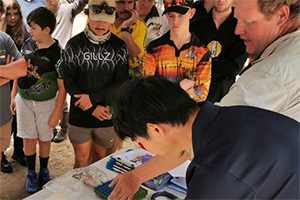Sustainability
- Home
- Locations
- What you can do
- LiFE Framework
- Sustainable Development Goals
- About us
- Grants
- Events
- Contact us
Now searching for:

Charles Sturt staff members An Vi Vu and Cameron McGregor demonstrate the fish tagging process in Deniliquin.
Charles Sturt University’s Gulbali Institute for Agriculture, Water and Environment has partnered with OzFish and Karltek on an innovative research project that leverages the efforts of ‘citizen scientists’ to gather crucial data in the Murray-Darling Basin. The project trains a select group of anglers in fish handling and passive integrated tagging (PIT) procedures, which involve implanting microchips in fish. These tags are later detected by specialised antennas placed throughout the river system.
The pilot study, funded by the Australian Government’s One Basin Cooperative Research Centre and other partners, aims to demonstrate that citizen scientists, when properly trained, can significantly contribute to large-scale scientific research. This initiative could reduce reliance on government resources while ensuring high-quality data collection. The first workshop was held in Deniliquin, with more planned across the Basin, focusing on ensuring ethical and scientifically robust methods.
This project represents a significant step forward in community-driven environmental conservation and research.
Find out more about
Citizen scientists